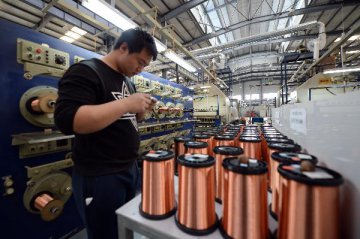
Strategic emerging industries are entering a critical stage. China needs to seize the opportunity. Both the Chinese government and enterprises are taking active actions to seize the opportunity. The added value of China's strategic emerging industries is expected to account for about 10 percent of the country’s GDP by the end of this year, and account for 15 percent in 2012, said Fei Zhirong, vice secretary-general of the National Development and Reform Commission (NDRC), at the first summit forum on the development of strategic emerging industries held by the State Information Center on July 5.
The NDRC will further implement the 13th Five-Year Plan for the development of national strategic emerging industries to drive the rapid development of relevant areas. Meanwhile, the NDRC will increase policy support and let financial capital play a driving role. Particularly, it will increase support for strategic emerging industries by increasing government procurement, encouraging coordinated growth between the financial capital and strategic emerging industries and encouraging financial institutions to use investment-loan investment and combination of equity and debt.
Strategic emerging industries are entering a critical stage.
Strategic emerging industries are entering a critical stage. China needs to seize the opportunity.
"In the past few years, we have tracked some companies. At the beginning, we thought they will cost lots of money. We feel even sorry if the situation lasts for less than 5 to 8 years. However, the fact is that lots of them obtained returns on investment after only 3-5 years,” said Du ping, secretary general of the Expert Advisory Committee on Strategic Emerging Industries.
He cited examples of government big data and government cloud. "Five years ago, we thought that the technology is not mature and the application environment is not improved. But now, there are all kinds of cloud services.”
"So we said that the development of strategic emerging industries has entered a critical stage. It is not only an urgent and important task today but also vital for China to achieve its two Centenary Goals.”
"At present, as the new round of technological revolution and industrial transformation is advancing, scientific and technological innovation activities around the world are active and gaining speed. So we must accelerate the pace of development,” said Yu Jian, deputy head of the Department of Technology Innovation and Development of the Ministry of Science and Technology (MOST).
Fei Zhirong also pointed out that strategic emerging industries cover all the primary, secondary and tertiary industries. These industries not only see the most concentrations of new technologies, new industries, new industrial formats and new models but also are an important support for a comprehensive transformation of traditional industries. The next 5 to 10 years will be a critical period for the new round of technological revolution and industrial transformation to enter a preparatory stage to an explosive stage.
"By 2020, China should strive to improve the proportion of the added value of strategic emerging industries to 15 percent of the country’s GDP. New generation of information technology, high-end manufacturing, biological, low-carbon, digital creativity will become new pillar industries of the country with a scale of 10 trillion yuan. There should also be new growth points formed in various cross-industries, creating over one million new jobs each year on average,” Fei Zhirong said.
It is gratifying that China has yielded multiple achievements in supercomputing, mobile communications, large aircraft, combustible ice, shale gas development, UHV power transmission, nuclear power, high-end CNC machine tools, high-speed railway and new energy vehicles, which provided strong driving power and support for the development of strategic emerging industries.
China will increase policy support in 9 fields
With the continuous innovation in science and technology, the connotation of strategic emerging industries is also constantly enriching. Meanwhile, the NDRC, the MOST and the Ministry of Industry and Information Technology (MIIT) are increasing policy support for strategic emerging industries.
"While speeding up the implementation of major projects and the application of major achievements, the MOST will actively promote the launch of the 2030 major technological innovation projects, striving to make first breakthroughs in the fields of artificial intelligence, quantum communications, brain science, deep sea equipment, aerospace, robot, new material, big data and information security by systematic deployment, so as to support the health development of emerging industries and new industry formats and accelerate the cultivation of growth points in strategic emerging industries,” Yu Jian said at the forum.
TF Securities analyst Tang Haiqing believed that quantum communication has become a new business card of China. The government attaches high importance on this field and included it as one of the 2030 major technological innovation projects.
As an important part of the new generation of information technology, 5G (fifth generation mobile communication) also sees rapid development.
"There is guarantee for China to strive to commercialize 5G in 2020,” said Zhu Fusheng, chief engineer from the wireless product management department of ZTE. He believed that by 2035, 5G will create an economic output of 12.3 trillion US dollars worldwide, which is almost equivalent to the total consumers spending in US in 2016.
As a communication infrastructure network, 5G is also closely related to big data, artificial intelligence, “Internet plus” and other emerging industries. It seems reasonable that both the government and enterprises are accelerating in development 5G.
In fact, the NDRC, MOST and the MIIT are increasing policy support for strategic emerging industries, including 5G.
It is reported that the MIIT will work with other ministries and commissions to establish industry alliances, to promote the development of intelligent manufacturing, 5G, big data, cloud computing, artificial intelligence, virtual reality, block chain and other industries.
“We should increase support to make these industries develop coordinately." Fei Zhirong said at the forum that the government should let financial capital play a driving role and strengthen weak links by increasing government procurement and promoting application demonstrations.
Fei also said that the government should also encourage coordinated growth between the financial capital and strategic emerging industries and encourage financial institutions to use investment-loan investment and combination of equity and debt to increase support for strategic emerging industries.
"To promote the work, the NDRC has cooperated with China Development Bank, China Construction Bank and other financial institutions,” Fei Zhirong said.
Translated by Coral Zhong




















Latest comments